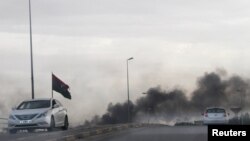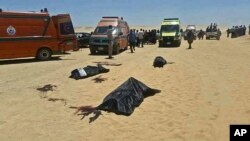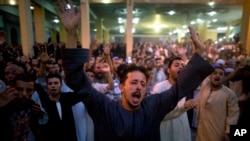When suicide bomber Salman Abedi, a 22-year-old British-Libyan, triggered his bomb packed with nuts and bolts Monday in Manchester, he not only brought Libya’s civil war to the streets of Britain, he may well have wrecked the chances of a peace deal being struck between rival governments and their militia backers in the strife-torn North African state.
The Manchester bombing that left 22 dead and dozens injured, mostly teenagers and children, has sparked an escalation in fighting in Libya in a war featuring a complex array of militias and three rival governments. All of them are vying not only for control of the country, but also backing from foreign powers.
All sides appeared to be seizing the opportunity of the Manchester attack, as well as the massacre Friday in Egypt of Coptic Christians by Islamic State fighters, to strike their foes — regardless of whether their enemies are linked to the bombing in Britain or the slaughter of Christian pilgrims in neighboring Egypt.
The escalation in fighting, especially in the Libyan capital, Tripoli, is darkening the prospects of a peace initiative led by the United Nations special envoy Martin Kobler. The U.N. envoy has been tireless in his efforts to broker an agreement between rival powers in a country that has known no peace since the uprising and NATO-backed overthrow six years ago of Libya’s dictator, Moammar Gadhafi.
Hopes dashed
Peace hopes had mounted earlier this month after two key rival Libyan leaders met face-to-face in Abu Dhabi, ending a 16-month stalemate that’s been undermining increasingly frenetic diplomatic efforts to unify the country and to stop the fighting between competing loose alliances that pushed the country into open warfare in 2014.
The meeting between Gen. Khalid Haftar, the head of military forces aligned to a government based in the east that’s backed by Egypt, and the GNA’s prime minister, Fayez al-Sarraj, was seen widely as the first step in a possible deal. But now hopes are being dashed and the peace process is unraveling because of an outbreak of intense fighting.
On Friday, Kobler appealed to “rival groups to stop fighting immediately and put Libyan national interest first.” His plea came after mainly Islamist militias opposed to the weak U.N.-backed Government of National Accord and loyal to a rival known as the National Salvation Government, launched a series of attacks in the capital, shattering weeks of relative calm in the city, and turning residential neighborhoods into war zones.
The U.N. envoy said he was following the situation with grave concern, insisting that “political aims must not be pursued through violence. Civilians must be protected.”
But despite the appeal, the attacks — coinciding with the start Saturday in Libya of Ramadan, Islam’s holy month — have included the shelling of residential districts in the south of the city, according to the British ambassador Peter Millett, along with clashes in parts of downtown Tripoli and along the city’s airport road.
GNA officials say that at least 52 of their fighters have died so far in the fighting, which has persisted into the weekend with loud explosions heard across the city. There were unconfirmed reports that civilians were among the dead and wounded.
Some GNA officials claimed the attacks by the mainly Islamist armed groups are in retaliation for the arrests in Tripoli midweek of the father and brother of the Manchester bomber by a militia loyal to U.N.-backed government. Salman Abedi’s father, Ramadan, has been linked to the militant Islamist group the Libyan Revolutionaries Operations Room.
“You have to ask yourself why they attacked now,” said an adviser to the GNA’s prime minister, Fayez al-Sarraj. But other GNA officials say they had expected an attack for weeks by Islamist-leaning militias, led by Salah Badi and Khalifa al-Ghwell, in a bid to try to reclaim lost territory in the capital. The flaring tensions in the country in the wake of the Manchester bombing may have contributed to the decision to launch the attacks this week, they say.
In turn, forces loyal to the GNA have seized Tripoli’s al-Hadhba prison, where former officials of ousted dictator Gadhafi have been incarcerated. The fate of the detainees is unknown.
IS claims Egypt attack
The Islamic State terror group claimed Saturday the slaughter of the 29 Christians, many of them children, in Egypt as its handiwork, saying in an online statement its affiliate in the country had carried out the attack. The Christians were traveling on a pilgrimage by bus to a monastery in Minya in central Egypt, 220 kilometers south of the capital, Cairo, when masked gunmen struck. The terror group put the number of dead at 32.
On Friday, Egypt retaliated, launching a half-dozen airstrikes on the eastern Libyan town of Derna, targeting what Egyptian President Abdul Fattah el-Sissi said were training camps where the militants behind the massacre had trained.
Sissi said he would "not hesitate to strike terrorist camps anywhere,” and announcing the strike in a television speech late Friday, he promised to “protect our people from the evil.”
Like the fighting in Tripoli, the Egyptian airstrikes are being seen by some analysts as opportunistic, too. The Islamic State was pushed out of Derna in 2015 and lost its remaining bases on the outskirts of the town last year, according to Mary Fitzgerald, a researcher on Libya, who covered the 2011 ouster of Gadhafi. She says the strikes “feed into suspicions that Sissi's airstrikes are opportunistic more than anything else and aimed at helping his ally Gen. Haftar.”
Derna residents say the six locations struck are residential areas. Some analysts say if training camps were struck they would have been controlled by mujahideen groups linked ideologically to al-Qaida and not the Islamic State.






